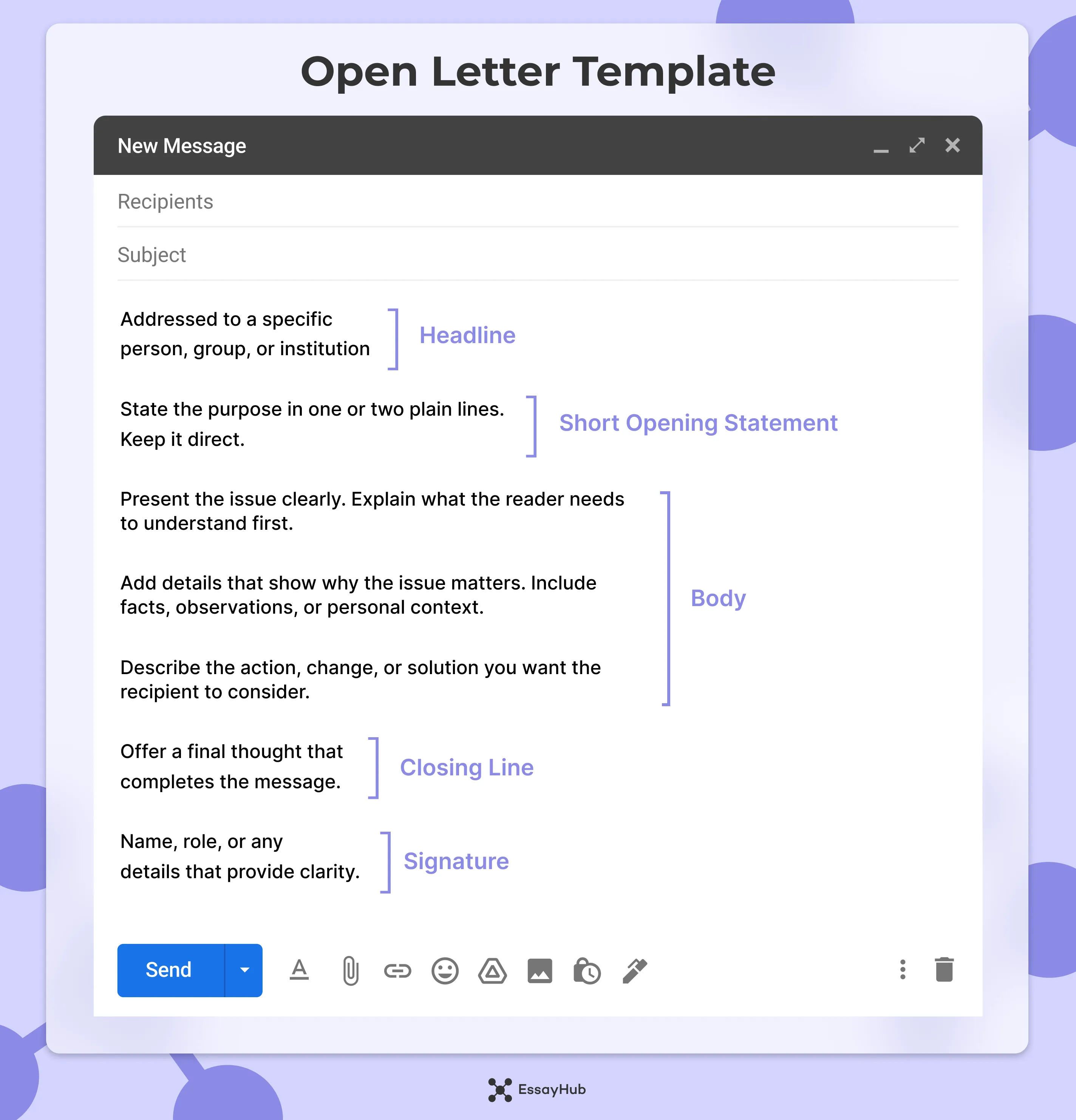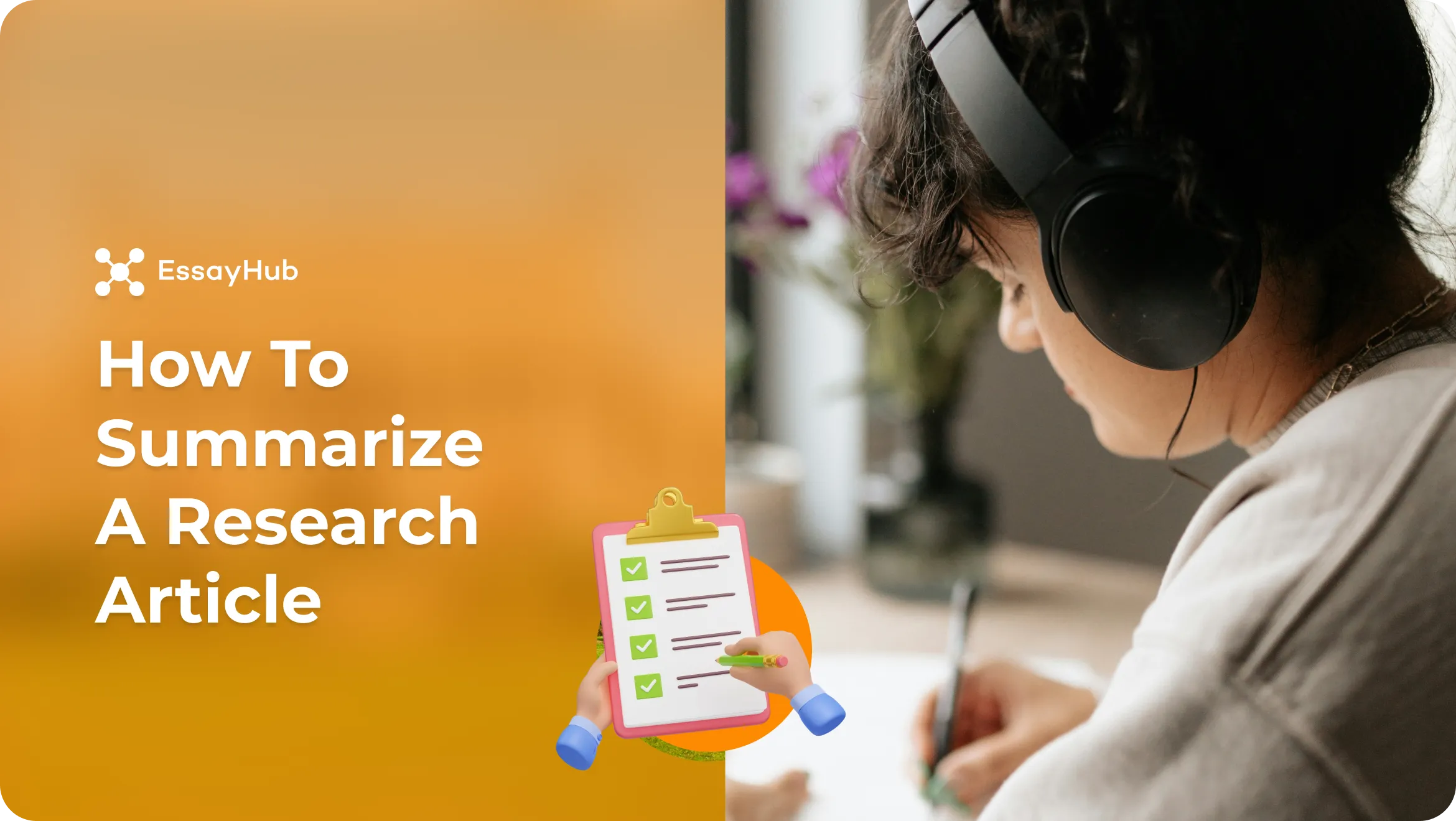An open letter is a public message written for a wide audience. It states a clear point and invites readers to pay attention to an issue that matters. A writer addresses a person or group in plain sight and puts an idea, request, or concern on record.
This guide walks through the process of writing an open letter and provides an open letter example for students. If you still have questions or need help after reading our article, you can always turn to EssayHub for extra support.
What Is an Open Letter?
An open letter is a public message written with a clear audience in mind, typically addressed to a specific person, group, or institution at the top. The writer states a position, request, concern, or idea in clear, straightforward language, allowing anyone to understand it. The letter serves as a direct address with a broader purpose, because the writer aims to draw attention to the issue beyond a private exchange.
The format suits situations that require transparency or accountability. Readers engage with the message as observers, and the named recipient understands the intent without confusion. An open letter works as both communication and a statement.
Pros and Cons of Writing an Open Letter
Before we explore how to write an open letter, it’s important to understand its key features and its strengths and weaknesses. Writing an open letter is not an easy task, so you have a lot to consider. You need to consider the pros and cons before deciding whether to write one. Take a look at the table below:
At the same time, there are some nuances to crafting an open letter, as with any other type of paper. You can ask for help from a write my college essay for me service online in case you are overwhelmed!
Reasons and Goals for Writing an Open Letter
No matter what the reason, the main goal of open letters is to make a difference in the world. Usually, they are addressed to government officials, corporate executives, the general public, or even celebrities. Let’s take a look at the main purposes of writing an open letter:
- To raise awareness about an important issue that is often ignored;
- To call for action on a specific issue, like climate change.
- To demonstrate a strong opinion or point of view, like criticism.
- To expose or call out a powerful person, so they can take accountability for their actions.
- To inspire others to take action on an important issue, for example, to vote or to donate.
It’s pretty obvious that all of these purposes are of paramount importance to the general public. You can use open letters to amplify the voices of those who often remain unheard. Keep in mind that if you're studying in one of the universities from the highest USA education ranking, you will need to know how to write one of your own.
Correct Open Letter Format
An open letter includes a named recipient, a direct purpose, and a structure that guides the reader without hesitation. Clear open letter formatting keeps the message organized and steady. Below is the full structure broken into parts, each with its own requirements:
Headline
- State who the letter addresses.
- Keep the line brief and unmistakable.
Opening Statement
- Explain the purpose in one or two lines.
- Set the tone without extra buildup.
Body Paragraphs
- Present the main point in clear sections.
- Support the idea with facts, observations, or lived experience.
- Maintain a direct voice that stays focused on the issue.
Closing
- Offer a final thought that completes the message.
- Add your name and any relevant details for context.
How to Choose a Target Audience for Open Letters?
You need to thoroughly think about who will be reading your letter. Here are some questions that you can ask:
- Who will be interested in the issue you are writing about?
- Who has the power to make a difference on this issue?
- Who is most likely to be convinced by your message?
Also, it’s critical to use the full titles of officials and government representatives in your letter.
Open Letter Template
A practical open letter opens with a headline that identifies the recipient, moves into a brief purpose statement, expands through clear paragraphs that explain the main point, and closes with a signature. The template keeps the message organized and leaves no confusion about who is being addressed or why the letter exists in public view.

How to Write an Open Letter Step by Step
To write an open letter, first focus on the issue you want people to notice. The next step shows why the topic matters to you and why your voice fits the moment. The final step points to a clear solution that you want the audience to understand. These steps keep the letter steady, honest, and easy to follow.
Step 1. Defining and Presenting the Issue
Here, you need to convince the audience that your problem is significant and that it has a negative impact on people around you. When presenting the issue, it is important to be specific and to provide evidence to support your claims. You can use statistics, research studies, or personal stories to add to the overall impact of the issue. Here is what you can explore:
- What is the purpose of an open letter?
- What is the problem?
- Who is affected by it?
- Why is it important to the general public?
Also, remember to be respectful to all people who are connected to your cause. Try to avoid personal attacks, even when you disagree with something. This will show that you can remain professional in spite of the circumstances.
Step 2. Explaining Your Motivation and Connection to the Cause
The second step in this process is to create a connection between you, your cause, and your readers. It’s always a good idea to present your personal connection to the issue and why you are passionate about it. For example, sharing your personal story is a powerful way to establish a relationship with the audience. They always like to know the face behind a letter!
When thinking about how to write an open letter, consider your own feelings as well. What would you like to read if you were a government official? What would make you care about the presented issue? What would make you build trust and credibility with the writer? For this, try to get back to your target audience and adjust your letter to them.
Step 3. Presenting the Solution to the Problem
Now that you have already hooked the reader with your issue, it’s time to present your solution. It’s your choice whether to write about specific actions or just to raise awareness about your cause. Still, you need to include a call to action and say what you want your reader to do after reading an open letter. For this part, you shouldn’t be too authoritative but rather encouraging.
Here are some examples of sentences that encourage people to take action:
- I urge you to take the following actions…
- I ask you to support policies…
- I encourage you to start an active discussion about…
- Together, we can change our future…
As you can see, it’s not about telling people what to do.
Open Letter Examples
This section brings together three famous open letter examples in PDF form so you can see how they work in real situations. One comes from the correspondence between Einstein and Freud. Another focuses on a public appeal sent to President Biden about the climate crisis, and the last one centers on a letter written to Elisabeth DeLuca, the owner of Subway. Each one shows a different way to speak to a public audience.
Open Letter Example #1: Open Letter to Elisabeth Deluca, Co-Owner of Doctor's Associates
This letter addresses concerns about management decisions at Subway. The writers outlined the issues they saw, explained why those decisions mattered, and asked DeLuca to respond publicly. The goal was clarity and accountability.
Open Letter Example #2: An Open Letter from the U.S. Scientists Imploring President Biden to End the Fossil Fuel Era
This letter asked the administration to move faster on environmental policy. The writers pointed to specific climate risks and urged the president to take action that matched the scale of those issues. The message focused on responsibility and timing.
Open Letter Example #3: Why War? An Open Letter from The Einstein-Freud Correspondence
This letter began with Einstein asking Freud a plain question about the roots of human aggression. Freud answered with a clear explanation grounded in psychology. Their exchange worked as a direct attempt to understand why large-scale conflict keeps appearing.
Final Thoughts
Open letters work well when the writer knows exactly what issue they need to address and who the letter must be aimed at. A clear recipient, a direct opening line, and a body that explains the issue step by step keep the message steady. The examples in this guide showed how the format shifts depending on the topic, but the core structure stays simple enough for any student to use.
If you’d prefer professional support, EssayHub's write my essay service can take over at any point.
FAQs
How to Finish an Open Letter?
A strong ending delivers one last message that completes the idea. The writer signs the letter and adds any needed information that helps readers understand the context.
How to Structure an Open Letter?
An open letter starts with the headline that names the recipient, the opening line that sets the purpose, the body that develops the issue in clear paragraphs, and the closing that signs off with a final point and a name.
How to Start an Open Letter?
A solid beginning uses a headline that clearly identifies the recipient. A short line follows and states the reason for writing without extra buildup.
What Is the Purpose of an Open Letter?
The purpose of an open letter is to place an issue in public view. The writer aims to make readers aware of a concern, request, or idea that needs attention.
What Does an Open Letter Mean?
An open letter is a public message written for a specific person, group, or institution, and anyone can read it. The writer names the recipient and speaks directly while keeping the audience wide.
- How to write a formal letter. (n.d.). BBC Bitesize. https://www.bbc.co.uk/bitesize/articles/zkq8hbk
- Schulten, K., & Proulx, N. (2024, March 12). To Whom Would You Write an Open Letter? https://www.nytimes.com/; The New York Times. https://www.nytimes.com/2024/03/12/learning/to-whom-would-you-write-an-open-letter.html
- Examples of business letter format. (n.d.). The Writing Center. https://writing.wisc.edu/handbook/businessletter/








